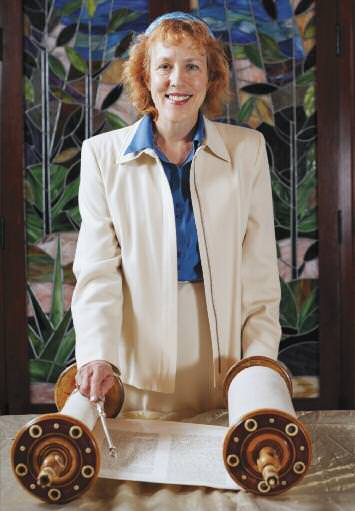edible notables
MINDFUL EATING
Shabbat and Passover provide opportunities to follow dietary laws.
WRITTEN BY MAGGIE O’NEILL
PHOTOS BY SHEA EVANS
Many religions call for adherence to certain dietary restrictions during specific days or times of the year. This is true for those of the Jewish faith, who are asked to avoid eating dairy and meat together, as prescribed by the religion’s dietary laws called kashrut.
These laws are not always easy to follow. To help with adherence, Temple Beth Or in Reno invites people to dairy potlucks on the first Friday of every month following Shabbat, or Sabbath, services, which usually start about 6 p.m. Generally, 25 to 35 people attend the potluck afterward.
“Dairy, vegetarian, egg, or fish (dishes) are brought for the community to share,” says Rabbi ElizaBeth Beyer of Temple Beth Or. “Bagels with lox and cream cheese are popular. During Chanukah, potato latkes are fried and served. The variety of dishes depends upon the season, and many people bring fresh produce from their gardens.”
For those in Lake Tahoe, dairy potlucks also are scheduled on the second, third, and fourth Fridays of every month at North Tahoe Hebrew Congregation in Tahoe Vista, Calif. This sister congregation to Temple Beth Or, where Rabbi Beyer also is the spiritual leader, has Shabbat services usually starting at 7 p.m.
“Practicing kashrut in a synagogue is done to help people better understand and practice it, as well as being a way for Jews of different levels of kashrut to be able to eat together,” Beyer says. “In other words, if someone keeps kosher, then we want to make sure that they can eat the food provided by our community either in Reno or at the lake.”
Rabbi Beyer knows why it is important to follow Jewish dietary law. Her rabbinical thesis was entitled Bringing G-d to Your Table: A Guide to Holy Eating, which focused on mindful eating. She also was an assistant professor of ethics with the University of Nevada, Reno’s Nevada Center for Ethics and Health Policy. Additionally, she has completed an extensive course offered through OHALAH, a Jewish Renewal rabbinic consortium, to become a Mashgiach, or expert kashrut supervisor, to ensure that food is prepared in a kosher, or “fit,” way.
“The course included learning about eco-kashrut, which means that one is mindful of using fresh, healthy, local, and ecologically sustainable products,” she says. “For example, the course taught the difference between regular eggs, cage-free eggs, and free-range eggs. From an ethical standpoint, free range is the better choice. It also is a better choice from a rabbinic standpoint because Jewish law requires us to avoid unnecessary pain to animals, since we are their stewards.”
With the start of the Jewish Passover approaching on April 14, the faithful have additional dietary laws to follow. These include not having any chametz, or leavened bread, which comes from wheat, rye, barley, oats, or spelt.
“During Passover, Jews are not allowed to eat or even be in possession of chametz,” Beyer says. “During that time, we have fruits, vegetables, eggs, fish, and matzah (unleavened bread), or non-chametz items, for our potluck dinners.”
As can be true with followers of any faith, adhering to religious dietary guidelines is not always easy and requires ongoing commitment and dedication.
“Perhaps the biggest kvetch (complaint) is the week of eating matzah, which is bland, and some people say tastes ‘like cardboard,'” Beyer says. “Once we avoid bread, pasta, cookies, pizza, and noodle products for a week, we certainly come to appreciate how ‘bread,’ in its various forms, is life sustaining.”
A local writer who enjoys writing about the uniqueness of the area, Maggie O’Neill also enjoys cooking for her husband and children, and makes a top-of-the-line banana bread. She admits she has never tried unleavened bread, however.
For details on Jewish dairy potlucks in the area, call:
Temple Beth Or in Reno: 775-322-5542
North Tahoe Hebrew Congregation in Tahoe Vista, Calif.: 530-546-0895


